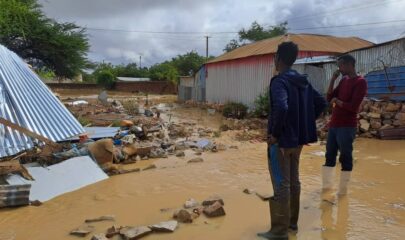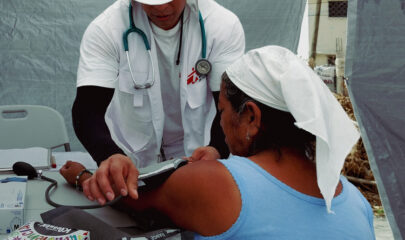“The severity, scale and speed of the war in Ukraine have created simply enormous needs and suffering,” says Dr. Joanne Liu, part of the Doctors Without Borders/Médecins Sans Frontières (MSF) emergency response team in Ukraine.
EMERGENCY MEDICAL SUPPLIES
Hospitals near frontline fighting and bombing have mostly needed surgical, trauma and wound care medicines and supplies. Needs have widened to include medicines for diseases such as asthma, hypertension, HIV, hypothyroidism and tuberculosis.
MSF has brought over 225 metric tonnes of medical and relief supplies into Ukraine, much of it sent to hospitals and health centres or to the Ministry of Health.
MEDICAL TRAIN REFERRALS
On April 1, MSF completed its first medical train referral. Nine patients wounded in or near Mariupol were taken from hospitals in Zaporizhzhia to hospitals in Lviv, together with their family members on a two-carriage train kitted out as a basic hospital ward.
Further medical referrals by train are ongoing as requests from hospitals in the east continue. [Editor’s note: As of June 6, MSF had transferred more than 650 patients by train.]
MASS CASUALTY TRAINING
A mass casualty situation is when a hospital receives many patients at once. MSF staff have experience in quickly triaging severe patients who need immediate treatment and patients who are less severe.
“[It’s] one of the most effective ways to save as many lives as possible,” says Barbara Maccagno, MSF emergency medi- cal coordinator in Ukraine.
“It can be learned quite easily,” says Maccagno, “but it does have to be practised, as it is different from the usual way hospital admissions work.”
MSF has conducted mass casualty training in over a dozen hospitals in Ukraine.
LESS VISIBLE NEEDS
Before the war started, we were treating tuberculosis patients in Zhytomyr; we continue to seek ways to support them, although this is challenging when people are on the move.
In Kyiv, MSF has established a hotline for people with non-communicable diseases. Elderly and vulnerable individuals as well as others can call to get medication delivered at home.
Our teams are also providing mental health support to people who have fled areas of active fighting.
AREAS WITH ACTIVE WARFARE
The greatest needs are undoubtedly in places with active warfare that our teams cannot reach.
Humanitarian supplies must be allowed to reach areas where civilians are in dire need. Civilians must be protected under the rules of war and international humanitarian law, in all places and at all times.
AROUND UKRAINE’S BORDERS
More than four million refugees have fled Ukraine for neigh- bouring countries, according to UNHCR.
Our teams are running clinics providing medical care and mental health support at border crossings, and sometimes on both sides of the border.
While the massive solidarity shown to Ukrainian refugees by individuals in neighbouring countries is heart-warming, we note with distress EU member states continue repressive approaches to safe passage for refugees of other nationali- ties arriving in Europe.
We urge safe passage and dignified reception for all people arriving in Europe as migrants, asylum seekers or refugees, wherever they arrive and by whatever means


